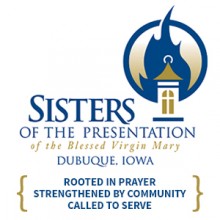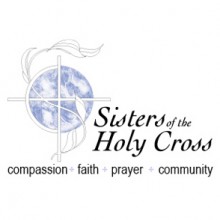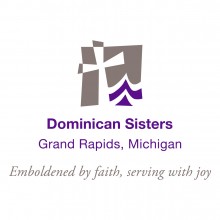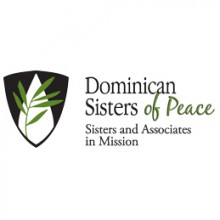I received a question from Donna about an important topic in religious life — the role of lay associates (or affiliates) in religious life. Here’s what Donna said:
What role do you think lay affiliates of religious orders will play in the future in religious life? Do you think these folk will be more integrated into a given community’s life (i.e., their ministries, activities, etc.) than they are now? How do you view the associates of your order? Is it difficult for older, more traditional sisters to accept associates?
First things first … Lay affiliates or associates are women and men who wish to formally associate themselves with a religious community, their mission and spirituality. Not all congregations have associates, and those that do vary in the formation process and the degree to which associates can be involved in the life of the congregation. For a specific example of a congregation’s associate program check out the the Monroe IHM page on IHM Associates.
Now, specifically regarding Donna’s questions … Lay people (including associates/affiliates) already play a significant role in many of our communities. They may hold significant positions in our institution such as financial manager, building administrator, nurse, development director, etc. While these positions are all responsible ultimately to the leadership of a religious community (which is made up of sisters who are our elected leaders/superiors and council members), they still are in positions which enhance and exert influence on the life of the community. Not every community, for example, has a sister who is trained in development work. So we hire someone who is willing to enter into our vision and work with us in that capacity. So congregations have for a long time now relied on the expertise and gifts of lay people. Associates/affiliates are lay people who formally choose to associate with us. They may already be our coworkers, alumna/us from our schools, relatives, former sisters, or simply innocent bystanders who somehow came in contact with us and are attracted to our mission and life. So, since lay people have for a while been part of religious communities, I believe they will continue to play a role in the future of religious life as well.
Do I think associates/affiliates will be more integrated into a given community’s life than they are now? Depending on a community, associates/affiliates may already be integrated into a community’s life. In any given congregation, there may be a range of ways an associate can be involved — from a prayer partner to heading a community’s office of peace and justice. An associate may come to one or two events yearly, while another associate may be on a committee and attend as many events as she/he is able to.
To take Donna’s question in another direction, one might ask (as many have): since some religious communities are experiencing a decrease in numbers, does that mean that communities will become more fully integrated with vowed and lay members in order for the community to survive? A big question which many communities have discussed. I’m not sure I can really answer this question. I do however think it is important to be clear about the significance of God’s call. Being an associate is part of a lay person’s larger call from God. The lay person may be married, have children, and/or be involved in some profession utilitizing their God-given gifts. The call to lay life is no less significant than the call to religious or ordained life. Choosing to associate oneself with a religious congregation does not mean that one wishes to be a quasi-nun. Quasi-nunness (for lack of a better word) is a disservice to the integrity of both the religious life vocation and the lay life vocation. They are two distinct lifestyles. Is there overlapping? Sure. Do we learn from one another? Absolutely. However religious communities proceed with associates/affiliates, I believe we must be clear about this.
In terms of how I view associates … check the link above to see my community’s web page on IHM Associates. I treasure our IHM Associates and have enjoyed working with IHM Associates on various committees and projects, learning with them, and worshipping with them. Each Associate in her or his own way enriches our community.
Finally, is it difficult for “older, more traditional sisters” to accept associates? I’m not really sure. We really can’t make generalizations about this group because there isn’t really one way that any particular age group or type (?) of nun thinks about a particular issue. In my experience, our sisters have been very welcoming of associates. There is a wisdom in our older members that sees beyond labels and embraces people for who they are and respects their journey. Whether liberal or traditional (I use such labels sparingly and with great caution because I believe they are too much of a generalization and do more harm than good), young or old, new to the community or a veteran, a sister may accept associates joyfully or with hesitation. There is such variance.
Well, there’s my two-cents … well, maybe four- or five-cents. Do comment, friends. I’d like to hear the range of thinking on the role of associates in religious life.
Archived Comments
- January 5, 2007 at 10:11 am
-
Our Associates are part of what give me hope about the future of religious life. They aree wonderful men and women who really carry our charism into the world. They also bring so much to our gatherings, our prayer, our discussion. We even have some associates who are exploring “new ways of belonging” and living with vowed members in intentional communities.
- January 5, 2007 at 1:16 pm
-
I, personally like the idea of lay members. I know a few young women who were lay members before entering vowed life, and they said it helped them greatly. I dont think that a large lay body is a substitute for professed religious. I have seen some communities with a large group of lay memebers, and not many accual nuns. I think that there needs to be a balance, in more ways than in numbers.
- January 5, 2007 at 2:15 pm
-
Julie and susan rose: Thanks for your thoughtful responses. I have a few comments to add.
To me, it seems the essential role of a lay associate (or any serious, practicing Christian for that matter) is akin to that of a sister; that is, to love, pray to and serve the Lord. Some of our ways of achieving this are obviously a little different – especially when it comes to our home lives and amount of time we have available for prayer. Lay associates and sisters can sometimes be kindred spirits as we have many of the same interests and motivations – to discern and act on the will of God in our lives.
One of the reasons I love to get together with some of the sisters is because it’s great to be with other spiritual people with whom one can share the faith and stories about the journey. It’s not always easy to do this in the outside world. It’s necessary sometimes, but it’s not always comfortable. To me, the monastery is a sort is sort of like an oasis in the desert.
There is a certain energy there. And it’s very peaceful. It’s easy to sense God’s presence there.I find the differences between sisters and lay are a joy. We really learn a lot from each other. So many sisters I know have been deeply prayerful women for decades. They are great as spiritual friends. Now let’s talk about education. Most of the sisters I know have been teachers, principals, counsellors and the like. This helps alot when we discuss child rearing! (My daughter is quite the challenge! I need all the help I can get.).
On the other hand, I think some of the sisters enjoy hearing our stories about the trials and tribulations of family life and our careers out in the secular world. Often, the job-related expertise of the lay associates can be helpful to the sisters. It seems we always have plenty to talk about. The fellowship is really nice.
I usually do a one-week silent retreat every summer and a few weekend ones during the year. I’d love to do a monastic live-in sometime – maybe for a month or so. But that isn’t going to happen anytime soon. As susan rose mentioned though, there are alot of new developments in this area.
Julie, it’s interesting you made that pseudo-nun comment. I certainly can’t speak for everyone, but I personally do what I do because of my desire to get closer to God. This sometimes involves me doing the same things nuns do. But it’s not because I think I’m a nun. It’s because I seek holiness and union with God. I hope I’m making myself clear. If not, ask away.
- January 6, 2007 at 10:14 am
-
Reading the comments here has given me a lot of food for thought…I’ve been an unaffiliated Benedictine Oblate for awhile. I’ve always had a hard time with receiving hospitality because it felt like I had nothing to give back. Maybe I do, after all…
- January 8, 2007 at 8:09 am
-
Donna, I am grateful for you taling about your experience. I absolutely agree with you that just because a lay person does things that are nun-like does not mean that you think you are a nun. The call from God is ultimately the same thing regardless of the particular lifestyle you are drawn to.
And thank you, Jen, for your comment. We all are gifted people and have much to offer one another. We never know sometimes the delight we bring to others just be simply being who we are!
- January 20, 2007 at 1:47 pm
-
I have always had an affinity and love for nuns and how they love the Lord and at one time considered the convent (youth and the world got in the way). That being said, I am over 60, divorced with no nullification, have adult children and grandchildren and most importantly a burning desire to serve our God in a community based way of life. I truly do not know where to start and any direction would be most appreciated. I just want to serve in any capacity and I want to allow Christ to shine through me. Thank you and God bless.
- January 21, 2007 at 9:04 pm
-
Hi Anne … thanks for your message. I think it is wonderful that you want to be in more of a community situation. It is a great way to serve God, learn more about oneself and others and God. I’d say check into a community that is intentional. There are some communities that have lay people, nuns/sisters/brothers, and priests. Some are ecumenical. If you are interested more in associating yourself with a particular congregation, check out either associate programs or congregations which have more of a community for/with lay people. I’m checking out a resource that one of my nuns has on lay communities. Will get back on this if it has some good info. Sister J
- February 4, 2007 at 8:52 pm
-
Anne: Some of the Benedictine monasteries have different types of “live-in” programs where you can stay there for a year or two. Each congregation works it a little differently. From what I gather, no financial payment is usually required but you work in one of their ministries in exchange for room and board. You participate in the community and prayer life of the sisters. I don’t know exactly how this all works, but I believe you have to get to know the community first, and they you, before you apply. I would think you need to go through some sort of a discernment period ahead of time too even though your stay would not be permanent. Just about every Benedictine house has a few weekly live-ins per year you could try out. One congregation that I know has/had such a program is The Benedictine Sisters of Erie, PA. Check them out. Look for others too. They are out there. BTW, hospitality is one of the Benedictine charisms.
- February 5, 2007 at 8:11 am
-
Anne, I found the directory and will send you some info. And thanks, Donna … good ideas!
- February 5, 2007 at 10:56 am
-
Thanks to Donna and Sr. Julie. Your input is invaluable and it gives me a starting point. You are in my prayers, please keep me in yours. God bless.








